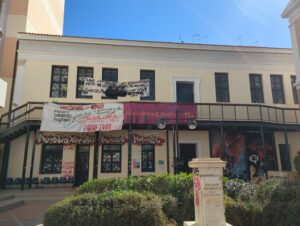Social ecology aims to build an inclusive and diverse “we”
By Marcel Suter
With the TRISE conference 2024 in Athens (25-27 November 2024), the social ecology movement has taken a big step forward in Europe. Around 200 participants discussed topics as diverse as urban planning from below, the gift economy, democratic confederalism, decolonial resistance in India and Ecuador, commons, matriarchal culture, indigenous self-management and food sovereignty. One focus was on communalist (or municipalist) practice. Contrasts also became visible – which is not a disadvantage, but a necessary prerequisite for a trusting, fecund culture of discussion in future debates.
Social ecology no longer occupies only a niche in political theory, but has become a growing movement worldwide. Always linked to a practice of prefiguration – building the future society in the here and now – it offers social movements from Barcelona to Rojava an inspiring theoretical foundation. Conversely, it allows the theory to be applied to existing projects that live a prefigurative, decentralized, egalitarian and cooperative practice – from local food systems of Ukrainian small farmers[1] to socio-ecological waste management[2] – which in turn enriches the theory and allows it to constantly evolve.
Athens’ Law School, one of the conference sites. Photo: M. Suter.
Around 200 activists and researchers drew an impressive picture of the current social ecology movement at the 5th conference[3] of the Transnational Institute of Social Ecology (TRISE). With over 30 presentations, six keynotes, four book launches and a film screening, each with Q&A, the three-day program was extremely dense and the range was enormous. Thematic blocks revolved around classic social-ecological topics such as the relationship between nature and society, decolonization, direct democracy, dual power, urbanism[4], commons[5], criticism of patriarchy and the Kurdish freedom movement. Despite the diversity, a common understanding of social transformation (bottom-up, autonomous, anti-authoritarian, inclusive, etc.) was palpable, uniting the participants in the spirit of the often-cited “unity in diversity”.[6] The fact that there was a brave space policy and that the first speaker, Krini Kafiris, spoke about sustainable practices in social movements – how burnouts and the reproduction of patriarchal norms can be avoided – certainly contributed to the good atmosphere. To paraphrase Audre Lorde: self-care is a radical political act.
Communalist politics in practice: autonomy or municipalism?
One thread that ran through the entire conference was direct democracy – in Bookchin’s words, the opening of a “political sphere” – in contrast to “statecraft”, i.e. the currently dominant (hegemonic), representative political system. But as we shall see, some contrasts emerged between the speakers.
Floreal Romero, being introduced by Trise organizer Theo Rouhette. Photo: aftoleksi.gr.
Floréal M. Romero[7] spoke from the perspective of the urgency of the current historical moment, in which capitalism concentrates all forms of domination of the past and, with its compulsion for growth, turns everything into a commodity, including us humans. Social ecology offers us an advantage if we want to diagnose this state of affairs and a clear vision for a “we” that can reclaim the political sphere. Roméro refers to the Spanish anarcho-syndicalists and Bookchin, but locates himself firmly in the non-institutional strategic wing. Conventional forms of action such as demonstrations, petitions or (trade uninionist) strikes have degenerated into mere rituals and are accepted by the system. “We need to rethink this and surprise the state,” he demanded. Alternatives such as housing projects, self-managed places, consumer cooperatives or syndicalism could help to build a parallel society to the state, which would enter into tension with it.
He repeatedly emphasized in his presentation that it was important to unite these projects into a movement. “Bringing the movements together“ (”rassembler les mouvements”) means taking care of the real needs of the actual people in the neighborhoods and villages, said Roméro. All areas that are neglected by the state are an opportunity for communalism. Examples include autonomous small farmers who share agricultural machinery or food autonomy in poorer neighborhoods, i.e. not just “organic for those who can afford it.” Social projects that respond to current needs are gradually creating the concrete places where utopia is becoming a reality – and now is the time to federate these projects.
On the other hand, Romero warned against reformism that serves apparent solutions on a silver platter and thereby absorbs the social movements. He is not very convinced by municipalism in Barcelona or the citizens’ lists in France, for example. “You lose sight of the goal: getting out of capitalism!” said Romero.
However, this was immediately followed by critical questions from the audience. Dimitri Roussopoulos[8] asked Romero how he saw the movement’s relationship to power and how counter-power could be institutionalized: “Why not simply seize municipal power, as in Montréal, if you already have a strong movement?” Floréal M. Romero replied that local power is generated when movements unite and create a balance of power (dual power) to overthrow capitalism. This attitude is close to indigenism, which also rejects capitalism and the state. But when attempts are made to enter state institutions, they often end in defeat. Nevertheless, Romero added: “But let’s keep an open mind, we’ll see …”
Municipalist practice in Madrid
On the next day Ana Méndez de Andés provided the counterpart to Floréal Romero’s presentation. When the municipalist platform Ahora Madrid won the elections in 2015, she was working as an urban planner for Madrid City Council. She was therefore able to report first-hand on municipalist practice – and her experiences were tough and sobering. As soon as the municipalist representatives arrived in the city government, they were surrounded by orcs – like in a scene in “Lord of the Rings”. The political establishment, the economy and the media were against them and, on the other hand, they were under pressure to meet the demands of the social movements. Although their own aspiration to transform the state and capitalism had always been there, it had been difficult to translate concepts such as urban commons into concrete policy. In the end, the political work, seen from the outside, could not be distinguished from conventional social democratic politics, despite the utopian horizon of a government “in common”. This was the furthest step that was possible under the actual circumstances. After all, “some transformations, in some localities, for some people” were possible, and this motivated the representatives of Ahora Madrid to stick to their ambitions.
One learning that Ana Méndez de Andés shared was that municipal politics cannot do without diplomacy and negotiation. For example, with transport workers, whose trust had plummeted due to the previous neoliberal and conservative governments. In the negotiations, it is necessary to change oneself and one’s own organization must accept this change, said Ana Méndez de Andés. However, she is disillusioned with libertarian municipalism in Madrid, a city of 3.5 million people: “People don’t want assemblies,” she said. “I honestly hoped that I would make myself redundant and empower the people”, but that didn’t happen because the people simply wanted a good government without austerity – and that’s what they got.
Nevertheless, Ana Méndez de Andés ended with a positive vision. She remains convinced that municipalism is an experiment in transformation that is closer to the people than others in terms of its approach. With practices of commoning, such as promoting access to urban space for all, a future “municipalist city in 30 years” could be prepared.
Synthesis: “There is no merit in purity”
On the third day of the conference, a block was dedicated specifically to direct democracy. Here it became clear that, in addition to the positions “outside the institutions” and “within the institutions”[9], a third position is possible, a synthesis of the two. Theodoros Karyotis, who announced his presentation, in the style of Bookchin, as a “polemic”, criticized both the anarchist tendency (which is against everything state-based and isolates itself) and the “constitutional” tendency (which makes itself dependent on parties and gives up its autonomy). Both have failed to bring about real change from below. “Both are based on a similar assumption of what power means. They don’t understand what it means.” The anarchist movement (in Greece) was unable to distinguish between representation and delegation and confused insurrection with revolution. Political power is not the same as the state (which is merely a specific configuration of political power). On the other hand, the municipalist experiments in Greece were more liberal than libertarian. Unfortunately, the left in Greece distrusts self-government.
Theodoros Karyotis proposes the following solution: “Build local power (power in place) and then use popular power to change our lives without embracing the party and top-down mentality.” On the one hand, this means bringing grassroots ethics to the public, but on the other, it also means approving of reforms that improve people’s daily lives. Not in the sense of municipalist social democracy, which would be a misunderstanding, but as “antagonistic reformism” that changes the institutions. And finally, we must use our countervailing power to secure our achievements (the commons) institutionally.
“There is no merit in purity and marginality!” Karyotis summed it up. Instead, we should try to build an inclusive and diverse “we”. This cannot be homogeneous, because we are not all workers and we are not all social ecologists. “A social revolution will not be possible if a critical mass cannot see itself in it,” emphasized Theodoros Karyotis. The process is necessarily messy and the contradictions cannot all be resolved before the revolution. It is now important to introduce the ideas of self-management and the commons into the political debate. “The grassroots ethos is much more popular than we think – we’re not trying hard enough to bring it to the public!” concluded Karyotis.
The democratic tradition
Yavor Tarinski[10] then gave an overview of the recent tradition of (direct) democracy, starting with C. L. R. James. These include the pan-African movement[11], the Caribbean movement[12] and examples from post-Soviet countries such as Bulgaria. Tarinski also mentioned the Haitian Revolution (which unfortunately took a turn for the worse), the councils in the Lebanese Revolution of 1971, the internationalist brigades in Greece in 1821 (long before the Spanish Revolution!), federations of self-governing communes in Russia, the communes in the Bulgarian uprising in the 1870s, the fascinating story of the commune in the mountains of Strandzha[13] in 1903 or the workers’ councils in the Hungarian Revolution of 1956. What these historical examples have in common is that the actors of the time did not simply want to impose their ideology on local communities, but created space for self-government. According to Tarinski, the Makhnovshchina or Strandzha commune protagonists did not want to govern the liberated villages, but told them: “Do it yourself!”
Although the TRISE conference was unable to reach a conclusive agreement[14] on municipalist/communalist strategy, the positions expressed provided a helpful guideline along which the debate on communalist politics can develop in the future.
Nature, decolonization … and everything else
As it is not possible to reproduce all the presentations here, only some of the topics are mentioned. (A look at the program for further research is highly recommended, and videos of the presentations are also available – see below).
Presenters Matthew Tafoya, Alex Foti, Krini Kafiris and Katerina-Shelagh Boucoyannis. Photo: M. Suter.
There was much discussion at the conference about the experiences in Kurdistan. The Academy of Democratic Modernity (ADM) explained the concepts of Democratic Confederalism, Democratic Autonomy and Democratic Nation, there was also an introduction to Jineolojî and Tekmîl, and on the first evening the film Belkî Sibê was shown, followed by a Q&A with filmmaker Alexis Daloumis, who fought against IS in Rojava in 2016/2017 and captured his experiences on camera. Among other things, the discussion revolved around the relationship between the Kurdish movement and the LGBT+ movement: Alexis Daloumis talked about the background to the internationalist brigade that went viral in 2017 because of a picture where they posed with a banner that says “These faggots kill fascists”, which caused some irritation. Daloumis and others are of the opinion that the Kurdish movement currently has a rather conservative attitude towards the LGBT+ movement, but that it is a generational thing and that this will change in the future.
Matthew Tafoya was one of the speakers on the topic of decolonization. As a representative of the Navajo Nation, he shed light on the phenomenon of “nation building”, i.e. the self-organization of indigenous tribes since the Self-Determination Act of 1975. While some tribes reproduce imperialist practices themselves (e.g. oil economy), some strive for more sustainable solutions, for example in energy production, food, housing and the economy. Social ecology is one model to reshape the reservation, but there are many ways.
Sinead D’Silva talked about the fight against a highway, train and power line project in Goa, which is accompanied by the destruction of the forest and the impairment of nature and people. Strategies include community organizing and public pedagogy, which often takes place anonymously due to repression, for example in churches and by means of zines. One advantage is that a communalist tradition is deeply rooted in the population. This manifests itself in panchayati (formalized municipalist governance in rural areas) and gaonkari (the “Commons Code“), among other things. Sinead D’Silva: “The relationship to the land and the obligation to fight for it is not even questioned!”
Katerina-Shelagh Boucoyannis reported on the fight against extractivism in the biodiversity-rich region of Intag, Ecuador. A counter-model to the colonialist “green transition” are local solutions such as community-based energy and watershed management with small hydropower plants.
“Matriarchal studies”, i.e. research on matriarchal societies and their values, as well as the maternal gift economy movement were just as much a topic as the role of shepherds in integral landscape management, or an intentional community in Missouri. A few presentations were somewhat at odds with the rest of the program, such as a contribution on tax incentives for more sustainability.[15] In any case, it is to be welcomed that this conference – and thus social ecology as a movement – is apparently attracting more and more attention and attracting a variety of people, from academics to activists.
Conclusion: building a diverse and inclusive movement
TRISE and the local organizational structure in Athens have succeeded in opening up a space for dialogue and the exchange of theory and practice. Such transnational conferences are invaluable for connecting actors and transferring practical knowledge between territories.
In any case, social ecology in Europe has taken another step forward with this conference. A desire shared by many is increasingly coming to the surface: to build[16] a collective but decentralized, autonomous and constantly evolving movement that is diverse and inclusive in the face of increasing crises – and has the potential to counter capitalist modernity in the context of a dual-power situation.
Marcel Suter is a founder of the German language Netzwerk für Kommunalismus (kommunalismus.org), and a participant in the social ecology mentorship program.
Photos: Greek Libertarian Journal & Website www.aftoleksi.gr and Marcel Suter
TRISE Conference 2024 links:
Program: https://trise.org/2024/10/12/trise-conference-program/
Videos: https://trise.org/2024/10/29/video-recordings-from-our-2024-conference/
Please help to cover the costs of the conference – Crowdfunding: https://gofund.me/fcd7f52a
Endnotes
[1] Natalia Mamonova reported on “silent food sovereignty” in Ukraine: a sustainable practice that is part of everyday life, not something special. Since the attack by Russia, it has become clear that neoliberal industrial agriculture is a giant with feet of clay. It is extremely vulnerable if the supply chains collapse. Small farmers, who were denigrated as “inefficient” during the Soviet era, could still plow their fields. However, it is difficult to win them over to foreign, abstract concepts such as food sovereignty. They do not want a revolution, but stability, even if this only means better integration into the neoliberal system. Natalia Mamonova therefore recommends not addressing such groups with radical proposals, but rather promoting existing, culturally recognized sustainable practices. Natalia Mamonova drew an interesting parallel in this respect with this year’s farmers’ protests in Europe. At first, large and small farmers protested together, but politicians only listened to the big farmers and abolished regulations that prevent accumulation. As a result, the small farmers (e.g. those organized in Via Campesina), who were in favor of more sustainability, withdrew. Natalia Mamonova did not come up with a concrete strategy for dealing with the European farmers’ protests, but warned against slipping into a nationalistic discourse.
[2] «Let’s make waste revolutionary again»: In his presentation, Federico Venturini outlined what waste management could look like from a socio-ecological perspective. From the realization that recycling is not enough and that a circular economy is necessary (“There are no landfills in nature”), it is only a small step to questioning power relations and our modes of production and consumption. And from there, the next step is to think about new societies beyond capitalism.
[3] The title of the conference was “The Politics of Social Ecology: From Theory to Praxis”, https://trise.org/2024/10/12/trise-conference-program/
[4] Jere Kuzmanić talked about anarchist influences in urban planning, from Kropotkin, Reclus and Mumford (the latter was mentioned in several papers) to Bookchin or Giancarlo De Carlo. Pijatta Heinonen presented her study on architectural structures in autonomous camps and occupations and the practices associated with them (plenums, working groups, self-organization, conflict resolution, skill sharing). Her research shows what urban planning can look like when the hurdles of private property are absent. Often, “if a place is empty, you can do it” and when needs change, communal spaces can be flexibly repurposed.
[5] Several contributions dealt with commons. Stavros Stavrides spoke about commoning processes, for example in Latin America, Naples and Athens. Among other things, he distinguished between public space and common space. The latter is created and kept open by the people, but does not rely on the state to guarantee it.
[6] Georgios Poulados, for example, pleaded for different groups such as feminists and workers, younger and older people with their different ideas, to unite in the sense of unity in diversity: “Differences lead to clashes; the only way to find a resolution is: to discuss.”
[7] Floréal M. Roméro is a driving force in building a socio-ecological and communalist movement in France and Spain. He is the author of the influential book Agir ici et maintenant (2019) and co-author, with Vincent Gerber, of Murray Bookchin et l’écologie sociale libertaire (2020).
[8] Canadian political activist and publisher Dimitrios I. Roussopoulos is a co-founder of TRISE, but is best known for his book publishing house Black Rose Books https://blackrosebooks.com/pages/about and his commitment to political movements. In Montréal, he is committed to political decentralization and radical municipalist community organizing. He was involved in the founding of the Milton Park project and was a confidant of Murray Bookchin.
[9] Of course, when it comes to municipalism, anchoring in extra-institutional social movements is indispensable. This was/is also very much the case with the municipalist experiences in Spain and elsewhere. Further information on current municipalism can be found at the European Municipalist Network (EMN) and at Fearless Cities.
[10] Articles and other texts by Yavor Tarinski can be found here:
https://towardsautonomyblog.wordpress.com/
and https://theanarchistlibrary.org/category/author/yavor-tarinski
[11] According to Yavor Tarinski, the American pan-Africanist author Modibo Kadalie is also part of this democratic tradition.
[12] See also: Quest, Edwards (2014): Workers’ Self-management in the Caribbean: The Writings of Joseph Edwards. On Our Own Authority! Publishing.
[13] https://towardsautonomyblog.wordpress.com/2022/06/06/the-commune-and-the-balkans-the-case-of-bulgaria/
[14] Another interesting debate, of a more conceptual nature, unfolded around the word “hegemony”. If we, as social ecologists, want to overcome the current capitalist hegemony, is that a non-hegemony or rather a counter-hegemony?
[15] However, topics that are not part of the socio-ecological “canon” should definitely be seen as enriching – as long as they do not run counter to the most basic principles. One contribution that was somewhat out of character, but provided interesting starting points, was Zdravko Saveski’s contribution on direct-democratic online voting combined with deliberative democracy. In the Q&A that followed, one person pointed out that deliberative democracy (e.g. citizens’ forums) is currently the subject of much discussion, for example at the recent Athens Democratic Forum, and that now is the best time to intervene in this debate.
[16] One model could be Les soulèvements de la Terre. In his contribution, Ewan Jenkins discussed the “composition” of social movements. Since the de-composition of the proletariat after 1968, the problem has been the lack of a social unit and a political subject. Ewan Jenkins (also with reference to Negri or Agamben) mentioned some unsatisfactory or failed attempts, such as the ZAD of Notre-Dame-des-Landes, which was a “false unity” of autonomous radicals and liberals. Occupy had shown that a multitude holding assemblies was not enough. He cited Les soulèvements de la Terre as a positive example of a successful composition. After the environmental activists joined forces with local water struggles (against the méga-bassines), the movement became huge. Autonomists, farmers, climate activists and even EU politicians can be found in the decentralized, “rhizomatic” network. Jenkins concluded by asking whether a new subject could emerge in this context: “Nature defending itself.” (Note: Due to the limited time available, there was no detailed discussion, but the ideas raised by Jenkins certainly have links to social ecology, for example to its concepts of “unity in diversity”, “general/particular” (Chaia Heller) or society as “nature rendered self-conscious”).
The post 2024 Trise Conference: appeared first on Institute for Social Ecology.
Leave a comment




